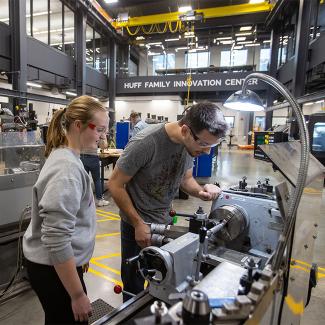What you'll learn as an Industrial and Systems Engineering major at UW-Platteville
Prepare for a hands-on and in-demand career as an industrial engineer through the guidance of the UW-Platteville Department of Mechanical and Industrial Engineering. In your industrial engineering courses, you’ll explore techniques and develop skills to help improve productivity in all types of companies by designing tasks, systems, and products that improve efficiencies while being safer, offering a higher return on investment, and making better use of resources.
UW-Platteville stands apart from other industrial engineering colleges. The program curriculum covers topics in ergonomics, work measurement, operations analysis, facility layout, management, and continuous improvement. Plus, At UW-Platteville our bachelor’s in industrial engineering curriculum is aligned with the Fundamentals of Engineering exam, the first step in becoming a licensed professional engineer, and our graduates have a passing rate that far exceeds the national average.
The Industrial and Systems Engineering program is accredited by the Engineering Accreditation Commission of ABET, https://www.abet.org, under the commission’s General Criteria and the Program Criteria for Industrial and Similarly Named Engineering Programs.
The Industrial and Systems Engineering Program’s Student Outcomes and Program Educational Objectives are available in the Undergraduate Catalog.
Industrial engineering graduates find themselves applying their analytical, computer, and communication skills across a wide variety of environments, including factories, health care institutions, colleges and universities, and more as they provide the interface between machines and people. Prospective students interested in earning a master’s in industrial engineering online can enroll in UW-Platteville’s Master of Science in Engineering program.
Careers in Industrial Engineering
Industrial engineers are responsible for coming up with effective and efficient procedures, whether that’s creating a product or providing a service—considering available resources including machines, materials, energy, information, and personnel. Depending on the nature of their roles, people who work as industrial engineers may spend their workdays in offices, on factory floors, or in other locations where they can apply their knowledge and skills to create solutions to problems.
Industrial engineering is a versatile degree, because it is not as specialized as some other types of engineering degrees. Careers for industrial engineers include those in a variety of industries, including manufacturing, consulting, professional, and scientific companies. Industrial engineers also work in research and development roles.
Some of the most common job titles for people with industrial engineering degrees include the following:
- Industrial engineer
- Production manager
- Quality engineer
- Manufacturing production supervisor
- Architectural manager
- Process engineer
- Manufacturing engineer
- Manufacturing technician
- Quality assurance inspector
- Industrial designer
There are tremendous opportunities for skilled industrial engineers in manufacturing settings, but there is also a need for highly trained industrial engineering professionals in hospitals and health care settings, utilities, food processing, transportation, governmental organizations, and more.

Discover by doing
The industrial engineering program at UW-Platteville provides a student-centric approach to education. Learning through a variety of hands-on, experiential opportunities and industrial engineering research projects prepares students for real-world success in their chosen careers, enabling them to address challenges and identify opportunities.







